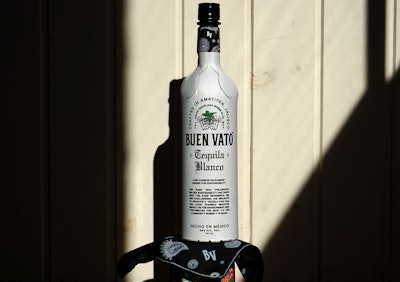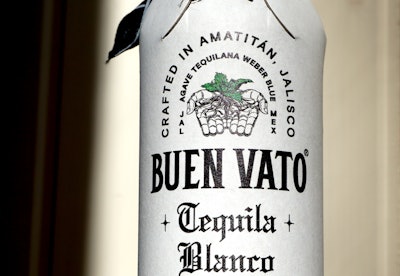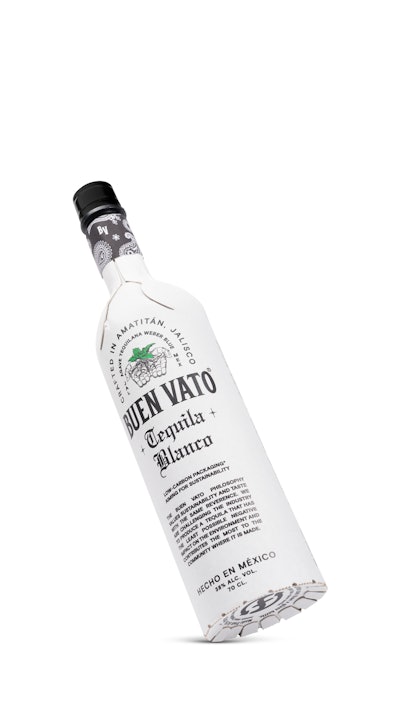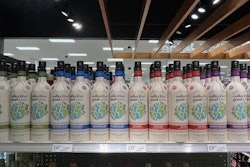
Claes Puebla Smith, CEO of emerging tequila brand Buen Vato, understands that by electing to launch in a paperboard bottle system with internal pouch, he isn’t choosing the easiest or least expensive path to market. He knows the brand will face the headwinds of a more expensive product for the consumer. He overcame some of those headwinds himself when convincing his team, investors, and distributors to try this paperboard route, even when the math on ROI and turning a profit looked daunting.
“Everybody was skeptical, saying there was no return on investment and this would never work. They thought that consumers wouldn’t pay more for a product that is packaged in a more ethical way,” Puebla Smith says. “And the more they told us, ‘You cannot do this,’ the surer we became that we needed to prove to the world that doing things as ethically and sustainably as possible is the right way. We went to all the distributors, all the other providers we’ve been working with for many years, and we said, ‘guys, look, this is the future, and we know how to do it. Let’s do it.’”
Location is important here. By launching in famously sustainability-minded Sweden, the land of Greta Thunberg, he expects that spirits lovers will be willing to pay a little extra for his premium tequila offering in what he says is an ecologically friendlier pack format. And when they do, he thinks his company will help to establish a toehold for the paperboard bottle format in tequila, and blaze a trail that peers and competitors in the tequila and larger spirits categories will willingly follow.
“We’re on a mission to shake-up the drinks industry by investing in sustainable manufacturing, transportation processes, and CSR (corporate social responsibility) initiatives,” Puebla Smith says.
The Swedish monopoly, a governmentally controlled retailing entity that handles all of Sweden’s alcoholic beverage market, will be the first retailer in the world to launch and sell Buen Vato.
Why take the paperboard bottle plunge?
The Buen Vato brand comes from AliasSmith AB, a brand owner and importer based in Stockholm, Sweden. For 18 years, the company has developed and invested in Mexican brands in Europe—largely in the beer, wine, and spirits category. In fact, it had already for a decade been distributing bottled tequila from the high-end Mexican distillery that would eventually produce Buen Vato. But when the process of importing heavy, liquid-filled glass bottles from across the Atlantic was examined by third-party environmental auditors, it was deemed ecologically untenable.
“[The auditing body] is called amfori BSCI, a certification that audits food and beverage in monopolies in the north of Europe,” Puebla Smith says of the organization with a stated goal of improving social performance in global supply chains. “They put this distillery under an audit to see if the CSR compliance was good enough. We had a few decent audits, then a few bad ones, and finally they told me, ‘Claes, this is a problem. If [the distillery doesn’t] fulfill our expectations next year, they’re out [Swedish monopoly won’t sell product that isn’t meeting certain amfori BSCI CSR qualifications].’”  Paperboard bottles are formed around empty foil laminated pouches and sealed with adhesive prior to filling.
Paperboard bottles are formed around empty foil laminated pouches and sealed with adhesive prior to filling.
In response, since 2019, AliasSmith AB spent almost 1,500 hours reshaping the processes and physical packaging structure for its preferred specialty distillery. The company went so far as to join the Swedish Beverage Industry’s Climate Initiative (DKI), with the goal of reducing the industry’s carbon footprint. Subsequently, AliasSmith decided to invest in projects with the lowest possible negative impact and inspire the industry to do better.
“After all, in our business of importing Mexican products in Europe, we sell in 27 countries through 54 different distributors. We bring in about three 40-foot containers a month,’ Puebla Smith says. “We joined the initiative of mapping all the carbon dioxide that we were generating with all the products we were selling. If you can measure it, you can probably improve it. That’s the whole idea.”
“Bag-in-bottle” format
To accomplish its recalibrated goals, and keep the third-party sustainability auditors happy, Buen Vato partnered with U.K.-based Frugalpac to incorporate its Frugal Bottle concept. Frugalpac “creates and supplies recycled paper-based products with the lowest carbon footprint, that are easily recycled again and don’t need to go to landfill,” it says in a briefing. “The format is lighter to transport than the glass alternative and offers major CO2 reduction in comparison to traditional industry methods.”
The format is functionally bag-in-box. In this case, the “box” portion begins as a die-cut and geometrically creased blank of printed paperboard. Being printed paperboard, no additional labels—or labeling equipment—are necessary. The rigid bottle is formed from one flat piece of paperboard, a blank with water-based adhesive used as part of the assembly process. The paperboard is then molded around a mandrel-shaped, hollow mold that has already had the pouch inserted within.
Sustainability chops
The Frugal Bottle itself is made from 94% recycled paperboard that acts as a rigid container protecting an internal, food-grade metalized PET pouch. At only 83 g, the bottle system is five times lighter than a glass bottle and, crucially, uses a lot less carbon and energy to produce and dispose.  Two-dimensional paperboard blanks are erected to form 3D half shells. Two corresponding shells, one front, one back, are mated together to fully enclose a metalized film pouch holding the liquid
Two-dimensional paperboard blanks are erected to form 3D half shells. Two corresponding shells, one front, one back, are mated together to fully enclose a metalized film pouch holding the liquid
“An independent Life Cycle Analysis (LCA) by Intertek found the Frugal Bottle, which is made from recycled paperboard with no chemicals, has a carbon footprint up to six times (84%) lower than a glass bottle, and more than a third less than a bottle made from 100% recycled plastic. The Frugal Bottle’s water footprint is also at least four times lower than glass,” the company says in a briefing. “It’s easy to recycle again. Simply separate the plastic food-grade pouch from the paper bottle and put them in your respective recycling bins. Or you can put the whole bottle in your paper recycling bin and the pouch will be easily separated in the paper re-pulping process. It also uses less plastic than a plastic bottle. The Frugal Bottle uses up to 77% less plastic—only 15 g, compared to a 64-g bottle made from 100% recycled plastic. The LCA looked at the ‘cradle to grave’ life cycle of all bottles, including mineral extraction, manufacture, transportation, distribution, filling and recycling or incineration.”
The food-grade pouch is a polyethylene terephthalate (PET) metallized polyester lamination, the same material used in bag in box wines. The company says it is recyclable, though capability to recycle such laminated, multi-layered materials may be limited and varies by region.
In the case of the Buen Vato application, the tequila is distilled in small batches in Jalisco, Mexico, then bulk shipped to the Netherlands. There it’s “bottled,” or more accurately, filled into flexible film liners that safely and securely reside inside the paperboard bottle structure. The fully erected “bag-in-bottle” containers are shipped empty to the Netherlands from the U.K., where Frugalpac operates bespoke bottle erecting and pouch attaching equipment.
“Frugalpac has been very enthusiastic in supporting us in the whole process,” Puebla Smith says. “Since the bottle is quite a bit different to what the bottler is used to [glass or rigid PET bottles], the Frugalpac people flew over to the Netherlands and spent the whole day together with the bottler to make sure that all the fine-tuning was well done. And this is something they didn’t charge us for.”
Adds Omar Corona, Mexican environmental engineer and head of the pollution reduction program of AliasSmith, “It’s time for a change where conscious consumers buy the nice [paper] board bottles and, if they wish to, pour their tequila into a crystal bottle at home. Why continue polluting so much to enjoy a tequila?”
Buen Vato is in negotiation with distributors in the U.K., Italy, France, and Spain. PW
At press time, Canadian packaging firm KinsBrae Packaging agreed on a deal to buy the first Frugal Bottle Assembly Machine, called FBAM-1, and install it in Canada. Puebla Smith is aiming to use capacity at that facility to sell Buen Vato into the North American market, without having to expend CO2 on shipping product from Mexico to Europe to be bottled, then sent back to the U.S. and Canada. The Mexican market is another target for Buen Vato, though some packaging standards red tape will need to be cut since Mexico doesn’t currently consider the paper bottle format to be within the pack format norm for tequila.






![Pw Cover 2[82]](https://img.packworld.com/files/base/pmmi/all/image/2022/06/PW_Cover_2_82_.62b4a095c6cfd.png?auto=format%2Ccompress&bg=fff&fill-color=fff&fit=fill&h=167&q=70&w=250)




















